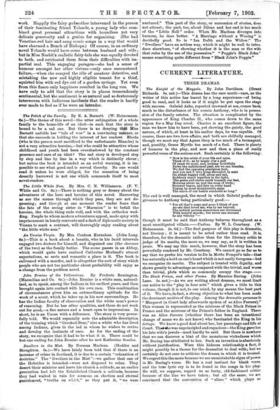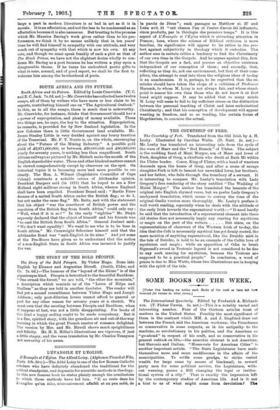C URRENT LITERAT ETRE.
THREE DRAMAS.
The Knight of the Maypole. By John Davidson. (Grant Richards. 5s. net.)—This drama has the rare merit—rare, as the writer of this notice has learnt by a long experience—of being good to read, and it looks as if it might be put upon the stage with success. Gabriel Ashe, reported drowned at sea, comes back much to the disturbance of his cousin Anthony, who is in posses- Mon of the family estates. The situation is complicated by the appearance of King Charles II., who comes down to the . same region for a May Day revel. Charles is an excellent figure, the man we know him to have been, yet showing the gaiety, the good nature, of which, at least in his earlier days, he was capable. Of course, there are two love affairs, and both are skilfully managed, though we must say that Agnes Grey is too much of a termagant, and, possibly, Grace Myrtle too much of a fool. There is plenty of humour in the play, and now and then a piece of really powerful verse of the serious sort. Such certainly is the following : "Now is the crisis of your life and mine. Think of it ; as by magic o'eragulf Of years we meet, and, looking doubtfully Down the unfathomed past, ere we can breath's, We find the opposing precipices knit, And you and I, who hung shrouded in mist On either rugged cliff, alone and sad, Suddenly stand together in the light, The green and stable earth beneath our feet, Morning about us, and the song of birds; Summer begun, and fate on every hand Urging by most decipherable signs
The union of our hearts sundered so long."
The end is well managed, the mood in which Gabriel prefers for. giveness to Anthony being particularly good :—
" For all that's come and gone I think of you As one that loved me, was by me beloved. The noblest natures sometimes are distressed With hateful moods; but never can succeed In any villainy "— though it must be said that Anthony behaves throughout as a most unmitigated villain.—Undine. By W. L. Courtney. (W. Heinemann. 2s. 6d.)—The first purpose of this play is dramatic, not literary ; it is meant to be acted rather than read. It is, therefore, for the dramatic rather than for the literary critic to judge of its merits, the more so, we may say, as it is written in prose. We may say this much, however, that the story has been powerfully rendered by Mr. Courtney. We cannot go so far as to say that we prefer his version to De la Motto Fouque's tale—that has naturally a hold on one's heart which is not easily foregone—but we recognise its merits. The subject is treated with dignity, and shows greatly to advantage as compared with the trivial, and worse than trivial, plots which so commonly occupy the stage. — The Black Prince, and other Poems. By Maurice Baring. (John Lane. 5s. net.)—As we are writing about dramas, we must limit our notice to the "play in four acts" which gives a title to this volume, though it is not, to our mind, by any means the best part of it. We have, in fact, a strong objection to what has been made the dominant motive of the play. Among the dramatis personae is "Margaret (a Court lady afterwards spoken of as Alice Ferrers)." This woman is represented as the mistress of the Black Prince in France and the mistress of the Prince's father in England. There was an Alice Perrers (whether there has been an intentional change of name we do not know) who fascinated the King in his dotage. We know a good deal about her, her parentage and life at Court. Thatehe was unprincipled and rapacious—the King gave her his late wife's jewels—need hardly be said. But there is nowhere that we can discover a hint of the monstrous wickedness which Mr. Baring has attributed to her. Such an invention is absolutely without justification. Were this hideous relationship a fact, it might possibly be a theme for the dramatist to deal with; but we certainly do not care to criticise the drama in which it is treated. We regret this the more because we see unmistakable signs of powei in Mr. Baring's verse. He has a real instinct for blank verse, and the true lyric cry is to be found in the songs in his play. He will, we suppose, regard us as fusty, old-fashioned critics because of the line we have taken; but all the same, we are convinced that the convention of " slime " which plays so large a part in modern literature is as bad in art as it is in morals. It is an affectation, and not the less to be condemned as an affectation because it is also nauseous. But trusting to the promise which Mr. Maurice Baring's work gives rather than to his per- formance, we think it by no means unlikely that in ten years' time he will find himself in sympathy with our attitude, and very much out of sympathy with that which is now his own. At any rate, and though we must speak frankly of such a plot as that of The Black Prince, we have not the slightest desire wholly to con- demn Mr. Baring as a poet because he has written a play upon a disagreeable theme. If he turns his undoubted poetic gifts to what is sane, normal, and of good report, we shall be the first to welcome him among the brotherhood of poets.











































 Previous page
Previous page